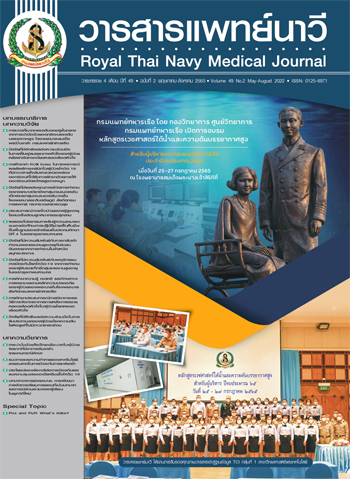ประสบการณ์การเจ็บป่วยของผู้สูงอายุโรคมะเร็งต่อมลูกหมากระยะลุกลาม
Main Article Content
บทคัดย่อ
การวิจัยครั้งนี้เป็นงานวิจัยเชิงคุณภาพแบบปรากฏการณ์วิทยาตามแนวคิดของ Martin Hediegger ผู้ให้ข้อมูลหลักในการวิจัย คือ ผู้สูงอายุโรคมะเร็งต่อมลูกหมากระยะลุกลามที่รับการรักษาด้วยการควบคุมฮอร์โมนทั้งในรูปแบบของการผ่าตัดอัณฑะและการใช้ยาอย่างน้อย 6 เดือนขึ้นไป จำนวน 13 ราย เก็บรวบรวมข้อมูลโดยการสัมภาษณ์เชิงลึก และนำข้อมูลที่ได้มาถอดความแบบคำต่อคำ ทำการวิเคราะห์ข้อมูลโดยการวิเคราะห์เนื้อหา ผลการศึกษา พบว่า ประสบการณ์การเจ็บป่วยของผู้สูงอายุโรคมะเร็งต่อมลูกหมากระยะลุกลาม ประกอบด้วย
1. ความหมายของการเจ็บป่วยด้วยโรคมะเร็งต่อมลูกหมากระยะลุกลามของผู้สูงอายุ โดยหมายถึง เป็นโรคที่เหมือนจะไม่รุนแรงแต่ต้องคอยติดตามผลเลือด
2. ประสบการณ์การเจ็บป่วยของผู้สูงอายุโรคมะเร็งต่อมลูกหมากระยะลุกลาม ประกอบด้วย 1) แรกรู้ก็ตกใจแต่ทำใจว่าใครก็เป็นได้ 2) ชีวิตที่เปลี่ยนแปลงไป 3) ความเข้าใจจากภรรยาและความผูกพันธ์ที่เพิ่มขึ้น 4) สนใจดูแลตนเองมากขึ้น 5) ได้รับกำลังใจในการใช้ชีวิตอยู่ต่อไป และ 6) การยอมรับความตายที่จะเกิดขึ้น
จากผลการวิจัยครั้งนี้ ทำให้เข้าใจประสบการณ์การเจ็บป่วยของผู้สูงอายุโรคมะเร็งต่อมลูกหมากระยะลุกลามมากยิ่งขึ้น และสามารถนำข้อมูลที่ได้จากการวิจัยไปประยุกต์ใช้ในการดูแลผู้สูงอายุด้วยความเข้าใจ และเป็นแนวทางในการประเมินความต้องการการดูแลของผู้สูงอายุแบบองค์รวมเพื่อส่งเสริมให้ผู้สูงอายุมีคุณภาพชีวิตที่ดีต่อไป
Article Details

อนุญาตภายใต้เงื่อนไข Creative Commons Attribution-NonCommercial-NoDerivatives 4.0 International License.
เอกสารอ้างอิง
European Association of Urology. Prostate cancer guideline 2018. [Internet]. [cited 2019 May 10]. Available from: http://uroweb.org/guideline/prostate-cancer/#1.
National Cancer Institute. Hospital-based cancer registry 2019. Bangkok: Pongsub Printing; 2020. (in Thai).
Manorom D, Paripattananon C, Sirapraphasiri P, Chaiweerawattana A, Imsamran W. Guidelines for screening, diagnosing and treating prostate cancer. Bangkok: Phosit; 2017. (in Thai).
The Thai Urological Association under the Royal Patronage. Prostate cancer patient guide 2017. [Internet]. [cited 2019 May 10] Available from: http://tuanet.org/wp-content/uploads/Prostate-Cancer-Guide.pdf. (in Thai).
Prostate Cancer Foundation of Australia. Advanced prostate cancer 2014. [Internet]. [cited 2019 May 10]. Available from: http://www.prostate.org.au/awareness/for-recently-diagnosed-men-and-their-families/advanced-prostate-cancer/.
American Cancer Society. Survival rates for prostate cancer 2017. [Internet]. [cited 2019 May 10]. Available from: https://www.cancer.org/cancer/prostate-cancer/detection-diagnosis-staging/survival-rates.html.
Jonsson A, Aus G, Berterö C. Men's experience of their life situation when diagnosed with advanced prostate cancer. Eur J Oncol Nurs 2009;13(4):268-73.
Auclerc G, Antoine EC, Cajfinger F, Brunet-Pommeyrol A, Agazia C, Khayat D. Management of advanced prostate cancer. The Oncologist 2000;5(1):36-44.
Paterson C, Robertson A, Nabi GJEJoON. Exploring prostate cancer survivors' self-management behaviours and examining the mechanism effect that links coping and social support to health-related quality of life, anxiety and depression: a prospective longitudinal study. Eur J Oncol Nurs 2015;19(2):120-8.
Chambers SK, Hyde MK, Laurie K, Legg M, Frydenberg M, Davis ID, et al. Experiences of Australian men diagnosed with advanced prostate cancer: a qualitative study. BMJ open 2018;8(2):e019917.
Clark JA, Wray NP, Ashton CM. Living with treatment decisions: regrets and quality of life among men treated for metastatic prostate cancer. Journal of Clinical Oncology 2001;19(1):72-80.
Ervik B, Asplund K. Dealing with a troublesome body: a qualitative interview study of men’s experiences living with prostate cancer treated with endocrine therapy. Eur J Oncol Nurs 2012;16(2):103-8.
Navon L, Morag A. Advanced prostate cancer patients’ ways of coping with the hormonal therapy’s effect on body, sexuality, and spousal ties. Qual Health Res 2003;13(10):1378-92.
Kornblith AB, Herr HW, Ofman US, Scher HI, Holland JC. Quality of life of patients with prostate cancer and their spouses: The value of a data base in clinical care. Cancer 1994;73(11):2791-802.
Rodsub N. Patriarchy: the reflection of the inequality between male and female in Asian society. Academic Journal of Humanities and Social Sciences Buriram Rajabhat University 2012;4(2):30-46. (in Thai).
King A, Evans M, Moore T, Paterson C, Sharp D, Persad R, et al. Prostate cancer and supportive care: a systematic review and qualitative synthesis of men's experiences and unmet needs. Eur J Cancer Care (Engl) 2015;24(5):618-34.
Sripha K. Hermeneutic phenomenology research in nursing. Journal of The Police Nurses 2012;4(2):1-18. (in Thai).
Faria-Schützer DBd, Surita FG, Alves VLP, Bastos RA, Campos CJG, Turato ERJC, et al. Seven steps for qualitative treatment in health research: the clinical-qualitative content analysis. Cien Saude Colet 2021;26(1):265-74.
Lincoln YS, Guba EG. Establishing trustworthiness. In: Lincoln YS, Guba EG, editors. Naturalistic inquiry. CA: Sage Publications; 1985. p. 289-327.
Litwin MS, Shpall AI, Dorey F, Nguyen T-H. Quality-of-life outcomes in long- term survivors of advanced prostate cancer. Am J Clin Oncol 1998;21(4):327-32.
Noppakun L, Indratula R, Vuttanon N. Quality of life among persons with prostate Cancer. Srinagarind Med J 2020;35(3):320-5. (in Thai).
Lofters A, Juffs HG, Pond GR, Tannock IF. “PSA-itis”: knowledge of serum prostate specific antigen and other causes of anxiety in men with metastatic prostate cancer. J Urol 2002;168(6):2516-20.
Nimitranan N, Chouwai S, Suebsoontorn W. Square-stepping exercise for fall prevention in community-dwelling elderly persons: a literature analysis. Royal Thai Navy Medical Journal 2021;48(1):23-36. (in Thai).
Stithyudhakarn S, Yunibhand J, Phaokuntarakorn W. The effect of self-management with family participation program on psychotic symptoms with chronic schizophrenia patients. Royal Thai Navy Medical Journal 2021;48(1):1-22. (in Thai).
Panuthai S, Srirat C, Wonghongkul T. Characteristics of a good death as perceived by related people in the upper northern Thai context. Journal of Thailand Nursing and Midwifery Council 2020;35(4):35-53. (in Thai).

